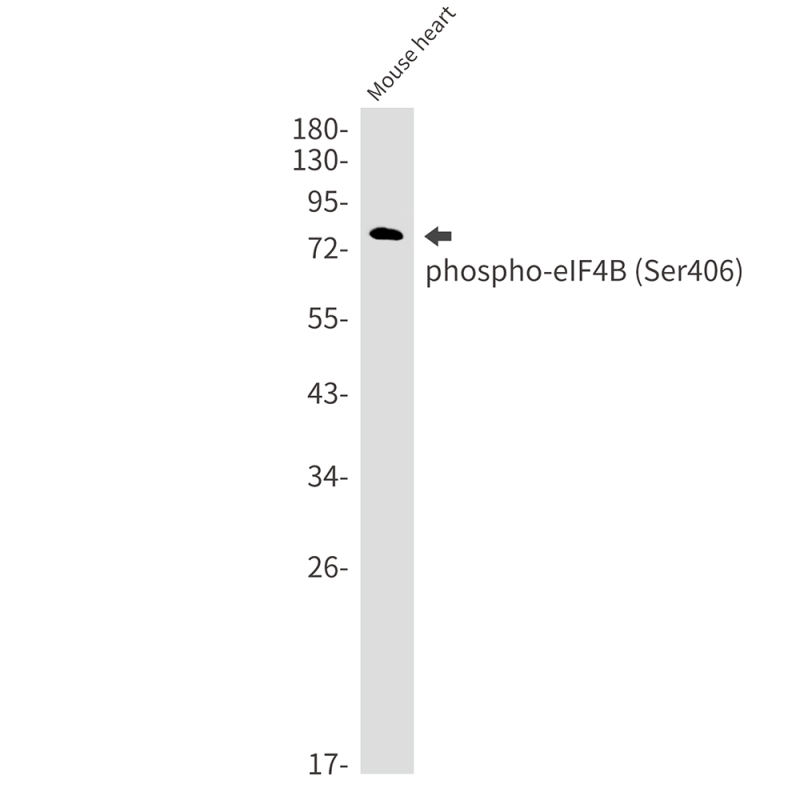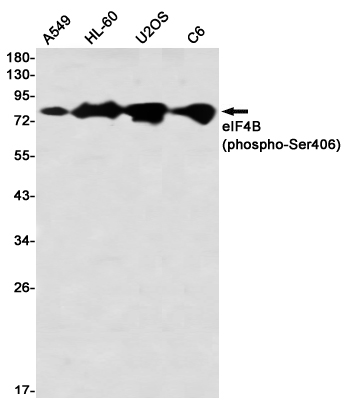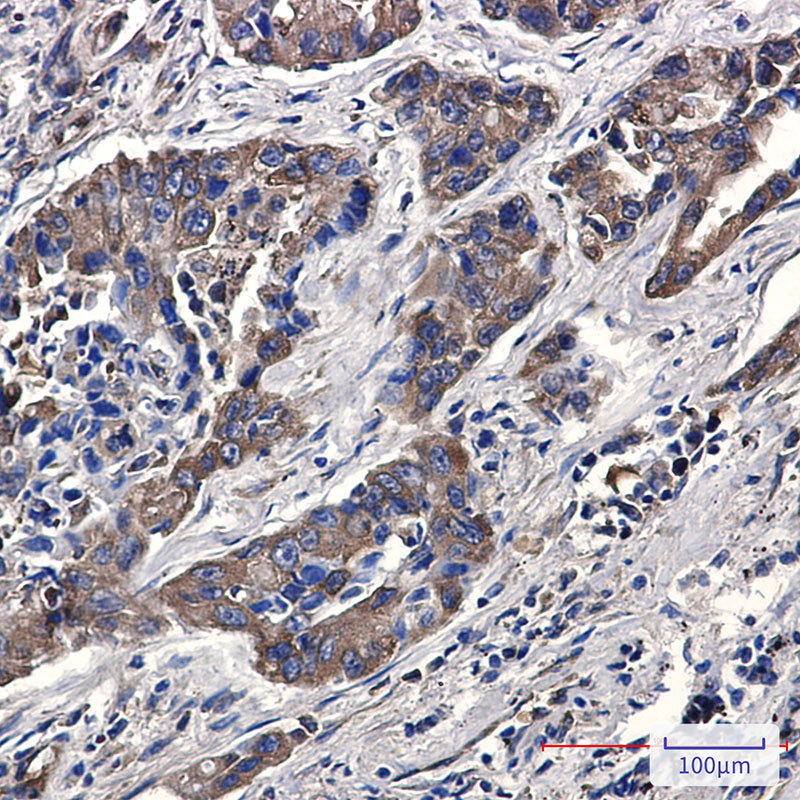


| WB | 咨询技术 | Human,Mouse,Rat |
| IF | 咨询技术 | Human,Mouse,Rat |
| IHC | 1/50-1/100 | Human,Mouse,Rat |
| ICC | 技术咨询 | Human,Mouse,Rat |
| FCM | 咨询技术 | Human,Mouse,Rat |
| Elisa | 咨询技术 | Human,Mouse,Rat |
| Aliases | EIF-4B; PRO1843 |
| Entrez GeneID | 1975 |
| WB Predicted band size | Calculated MW: 69 kDa; Observed MW: 80 kDa |
| Host/Isotype | Rabbit IgG |
| Antibody Type | Primary antibody |
| Storage | Store at 4°C short term. Aliquot and store at -20°C long term. Avoid freeze/thaw cycles. |
| Species Reactivity | Human,Mouse,Rat |
| Immunogen | A synthetic phosphopeptide corresponding to residues surrounding Ser406 of human eIF4B |
| Formulation | Purified antibody in TBS with 0.05% sodium azide,0.05%BSA and 50% glycerol. |
+ +
以下是关于 **Phospho-eIF4B (Ser406)** 抗体的参考文献及其摘要的简要整理:
---
1. **"The translation factor eIF4E promotes tumorigenesis and prevents apoptosis"**
- **作者**: Ruggero D, et al.
- **摘要**: 该研究探讨eIF4B在癌症中的调控作用,发现其Ser406位点的磷酸化通过mTOR信号通路增强,促进肿瘤细胞存活和增殖。使用Phospho-eIF4B (Ser406)抗体验证了该修饰在肿瘤模型中的表达水平。
2. **"mTORC1-mediated cell proliferation, but not cell growth, controlled by the 4E-BPs"**
- **作者**: Holz MK, et al.
- **摘要**: 研究揭示了mTORC1通过磷酸化eIF4B的Ser406位点调控蛋白质翻译起始。作者利用特异性抗体证明,该修饰对核糖体招募和细胞生长至关重要。
3. **"Regulation of eukaryotic initiation factor 4B by S6 kinase in protein synthesis"**
- **作者**: Shahbazian D, et al.
- **摘要**: 通过体外和体内实验,证明S6激酶(S6K)直接磷酸化eIF4B的Ser406位点,促进mRNA结合及翻译效率。研究中采用Phospho-eIF4B (Ser406)抗体进行Western blot分析。
4. **"S6K1- and βTRCP-mediated degradation of PDCD4 promotes protein translation and cell growth"**
- **作者**: Dorrello NV, et al.
- **摘要**: 该文献发现DNA损伤应激下,eIF4B的Ser406磷酸化水平受动态调控,影响翻译恢复。通过特异性抗体检测到该位点的修饰与细胞应激反应和凋亡抵抗相关。
---
**备注**:以上文献均涉及Phospho-eIF4B (Ser406)抗体的实验应用,涵盖其在癌症、翻译调控及应激反应中的功能研究。建议通过PubMed或期刊官网输入标题或DOI获取全文。
The Phospho-eIF4B (Ser406) antibody is a specialized tool used to detect the phosphorylation status of eukaryotic translation initiation factor 4B (eIF4B) at serine residue 406. eIF4B is a critical regulatory protein in mRNA translation initiation, promoting ribosome recruitment to mRNA by facilitating the helicase activity of eIF4A and stabilizing interactions between the 43S preinitiation complex and mRNA. Phosphorylation at Ser406 is a key post-translational modification that enhances eIF4B's activity, particularly under stress conditions or growth factor stimulation. This modification is primarily mediated by the mTORC1 (mechanistic target of rapamycin complex 1) and MAPK (mitogen-activated protein kinase) signaling pathways, linking translational control to cellular proliferation, survival, and stress responses.
The Phospho-eIF4B (Ser406) antibody is widely employed in research to study translational regulation in contexts such as cancer, metabolic disorders, and cellular stress. It enables the detection of activated eIF4B in techniques like Western blotting, immunofluorescence, and immunohistochemistry. By assessing Ser406 phosphorylation, researchers gain insights into mTORC1/MAPK pathway activity and their roles in diseases. Validation of this antibody typically includes testing in knockout models or phosphatase-treated samples to confirm specificity. Its applications extend to preclinical studies targeting translation machinery for therapeutic interventions, particularly in cancers with dysregulated mTOR or MAPK signaling.
×